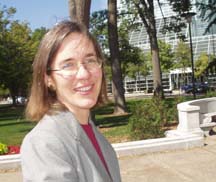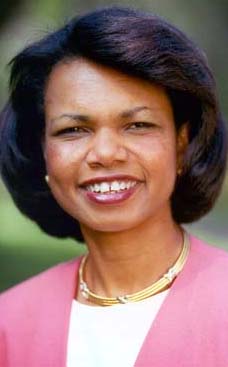2006.03.02: March 2, 2006: Headlines: Figures: COS - Cameroon: Journalism: Speaking Out: Energy: Alternative Fuels: The Capital Times: Margaret Krome says: Fuels must change, but so should consumption
Peace Corps Online:
State:
Wisconsin:
February 8, 2005: Index: PCOL Exclusive: Wisconsin:
2006.03.02: March 2, 2006: Headlines: Figures: COS - Cameroon: Journalism: Speaking Out: Energy: Alternative Fuels: The Capital Times: Margaret Krome says: Fuels must change, but so should consumption
Margaret Krome says: Fuels must change, but so should consumption

"It was good to hear President Bush address alternative energy in his State of the Union message last month. But later he struggled to explain why the federal alternative energy program was cut in his fiscal 2007 budget. His emphasis on solving our energy problems with new technologies is an important start, although one that holds promise only if he and Congress actually fund it." Journalist Margaret Krome served as a Peace Corps Volunteer in Cameroon.
Margaret Krome says: Fuels must change, but so should consumption
Margaret Krome: Fuels must change, but so should consumption
By Margaret Krome
I can tell by the glint in his eye that our son has a new campaign under way. Always a subtle and tactical advocate, he's working on his parents to buy an old van, convert it to burn biodiesel fuel and then brew up biodiesel from old restaurant oil.
Inspired less by Willie Nelson's BioWillie diesel fuel than the practical experience of friends who have done this, I am sure that Martin could make it work. And however amusing it would be to drive a vehicle that makes the air smell like french fries, I don't discount as foolish any creative efforts to solve our nation's 20 million barrel-a-day petroleum addiction or reduce global warming.
It was good to hear President Bush address alternative energy in his State of the Union message last month. But later he struggled to explain why the federal alternative energy program was cut in his fiscal 2007 budget. His emphasis on solving our energy problems with new technologies is an important start, although one that holds promise only if he and Congress actually fund it.
Some new technologies make more sense than others. For example, the energy conservation of most grain-based ethanol is moderate at best. Some people say corn-based ethanol takes more energy to create than it makes, but that overstates the case because conversion processes have become more efficient and ethanol's distillery grains have additional energy value as feed for livestock. But it's still an inefficient process, and like any crop grown repeatedly, requires large petrochemical inputs for pesticides and fertilizers. Also, large acreage investments in grain-based ethanol feedstocks would take a heavy toll on the land from soil erosion, nutrient runoff into water bodies and loss of wildlife habitat.
There is greater hope for ethanol blends based on using resource-conserving crops like switchgrass. But these are not panaceas either. First, biologists worry that cellulose harvested for ethanol on the scale proposed would constitute a significant biological loss to natural systems that use the cellulose as part of nutrient cycling and ecosystem food chains. Also, even cellulose-based ethanol's efficiency, while greater than that from grains, still isn't high.
I have a private passion for photovoltaic cells, windmills and, like my son Martin, new fuels. But there has been limited policy support nationally. For example, in last year's energy bill, Bush opposed including a national requirement that utilities generate 10 percent of their energy from renewable sources by 2020, even though experts predicted a negligible impact on utilities' bottom line. But even if new technologies received optimal support, experts say that they alone cannot correct the nation's energy deficit, if we consume energy at current rates.
Conservation has been the neglected part of the energy policy equation. The problems we seek to address derive from human behavior. As a first measure, policymakers need to create incentives and regulations that will result in significantly reduced consumption of fuels.
Interestingly, many industry leaders now recognize that, given the volatility of climate and fuel, their investments would profit from the greater predictability that arises from mandatory emission reduction standards. But there has been poor voluntary compliance by industry when it comes to energy regulations, so policymakers must use sticks as well as carrots.
The single most important area for increased fuel efficiency is in motorized vehicles. A crucial tool to reduce fuel consumption, tightening the Corporate Average Fuel Efficiency standards, for example, hasn't happened as a voluntary matter. Similarly, utilities need to be pressed to encourage residential conservation, and industry needs similar policy signals.
State and federal policymakers rightfully are exploring many options to address our short-term and long-term power needs. But it will always be more popular to discuss developing new energy sources, with the potential that they offer for new markets, than to address the harder but essential need to reduce consumption. Both are needed.
Margaret Krome of Madison writes a semimonthly column for The Capital Times. E-mail: mkrome@inxpress.net
Published: March 2, 2006
Copyright 2006 The Capital Times
When this story was posted in March 2006, this was on the front page of PCOL:





Peace Corps Online The Independent News Forum serving Returned Peace Corps Volunteers
 | History of the Peace Corps
PCOL is proud to announce that Phase One of the "History of the Peace Corps" is now available online. This installment includes over 5,000 pages of primary source documents from the archives of the Peace Corps including every issue of "Peace Corps News," "Peace Corps Times," "Peace Corps Volunteer," "Action Update," and every annual report of the Peace Corps to Congress since 1961. "Ask Not" is an ongoing project. Read how you can help. |
 | The Peace Corps Library
The Peace Corps Library is now available online with over 40,000 index entries in 500 categories. Looking for a Returned Volunteer? Check our RPCV Directory. New: Sign up to receive PCOL Magazine, our free Monthly Magazine by email. Like to keep up with Peace Corps news as it happens? Sign up to recieve a daily summary of Peace Corps stories from around the world. |
 | Peace Corps suspends program in Bangladesh
Peace Corps Director Gaddi H. Vasquez announced the suspension of the Peace Corps program in Bangladesh on March 15. The safety and security of volunteers is the number one priority of the Peace Corps. Therefore, all Peace Corps volunteers serving in Bangladesh have safely left the country. More than 280 Peace Corps volunteers have served in Bangladesh since the program opened in November 1998. Latest: What other newspapers say. |
 | Invitee re-assigned after inflammatory remarks
The Peace Corps has pulled the invitation to Derek Volkart to join the Morocco Training Program and offered him a position in the Pacific instead after officials read an article in which he stated that his decision to join the Peace Corps was in "response to our current fascist government." RPCV Lew Nash says that "If Derek Volkart spoke his mind as freely in Morocco about the Moroccan monarchy it could cause major problems for himself and other Peace Corps volunteers." Latest: The Ashland Daily Tidings has issued a request for all Peace Corps communications on the case. |
 | Re-envision Peace Corps
Nicholas J. Slabbert says in his article in the Harvard International Review that an imaginatively reinvented Peace Corps could powerfully promote US interests in a period when perceptions of American motives are increasingly relevant to global realignment. His study envisions a new role for the Peace Corps in five linked areas: (1) reinventing America's international profile via a new use of soft power; (2) moving from a war-defined, non-technological, reactive theory of peace to a theory of peace as a normal, proactive component of technologically advanced democracy; (3) reappraising Peace Corps as a national strategic asset whose value remains largely untapped; (4) Peace Corps as a model for the technological reinvention of government agencies for the 21st century; (5) redefining civil society as information technology society. Read the article and leave your comments. |
 | March 1, 1961: Keeping Kennedy's Promise
On March 1, 1961, President John F. Kennedy issues Executive Order #10924, establishing the Peace Corps as a new agency: "Life in the Peace Corps will not be easy. There will be no salary and allowances will be at a level sufficient only to maintain health and meet basic needs. Men and women will be expected to work and live alongside the nationals of the country in which they are stationed--doing the same work, eating the same food, talking the same language. But if the life will not be easy, it will be rich and satisfying. For every young American who participates in the Peace Corps--who works in a foreign land--will know that he or she is sharing in the great common task of bringing to man that decent way of life which is the foundation of freedom and a condition of peace. " |
 | Paid Vacations in the Third World?
Retired diplomat Peter Rice has written a letter to the Wall Street Journal stating that Peace Corps "is really just a U.S. government program for paid vacations in the Third World." Director Vasquez has responded that "the small stipend volunteers receive during their two years of service is more than returned in the understanding fostered in communities throughout the world and here at home." What do RPCVs think? |
 | RPCV admits to abuse while in Peace Corps
Timothy Ronald Obert has pleaded guilty to sexually abusing a minor in Costa Rica while serving there as a Peace Corps volunteer. "The Peace Corps has a zero tolerance policy for misconduct that violates the law or standards of conduct established by the Peace Corps," said Peace Corps Director Gaddi H. Vasquez. Could inadequate screening have been partly to blame? Mr. Obert's resume, which he had submitted to the Peace Corps in support of his application to become a Peace Corps Volunteer, showed that he had repeatedly sought and obtained positions working with underprivileged children. Read what RPCVs have to say about this case. |
 | Why blurring the lines puts PCVs in danger
When the National Call to Service legislation was amended to include Peace Corps in December of 2002, this country had not yet invaded Iraq and was not in prolonged military engagement in the Middle East, as it is now. Read the story of how one volunteer spent three years in captivity from 1976 to 1980 as the hostage of a insurrection group in Colombia in Joanne Marie Roll's op-ed on why this legislation may put soldier/PCVs in the same kind of danger. Latest: Read the ongoing dialog on the subject. |
 | Friends of the Peace Corps 170,000 strong
170,000 is a very special number for the RPCV community - it's the number of Volunteers who have served in the Peace Corps since 1961. It's also a number that is very special to us because March is the first month since our founding in January, 2001 that our readership has exceeded 170,000. And while we know that not everyone who comes to this site is an RPCV, they are all "Friends of the Peace Corps." Thanks everybody for making PCOL your source of news for the Returned Volunteer community. |
Read the stories and leave your comments.

Some postings on Peace Corps Online are provided to the individual members of this group without permission of the copyright owner for the non-profit purposes of criticism, comment, education, scholarship, and research under the "Fair Use" provisions of U.S. Government copyright laws and they may not be distributed further without permission of the copyright owner. Peace Corps Online does not vouch for the accuracy of the content of the postings, which is the sole responsibility of the copyright holder.
Story Source: The Capital Times
This story has been posted in the following forums: : Headlines; Figures; COS - Cameroon; Journalism; Speaking Out; Energy; Alternative Fuels
PCOL32163
03


















